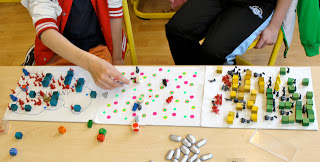German boardgames are naturally a
favorite gift I’ve enjoyed giving to friends and family back in the United
States. In addition to that, I used to design an original boardgame for my two
nieces as a Christmas present every year.
It’s not easy to shop for them when we live an ocean away from each
other, and this was a way I could give them something personal. I also did try
to theme many of the games around activities they enjoyed.
When my designs began to get published, I gave them those as
gifts. Now that they are older—and very creative—I thought I would instead give
them the materials to be game designers themselves.
A year and one-half ago I sent them a “game design kit” with
materials ordered from Spielmaterial. They included a blank game box, a deck
of blank cards, a blank fold-out game board, a 6-color die, one large pawn, 6
normal dice in 6 colors, and large and small wooden discs and “meeples”
(human-shaped figures) in 6 colors.





